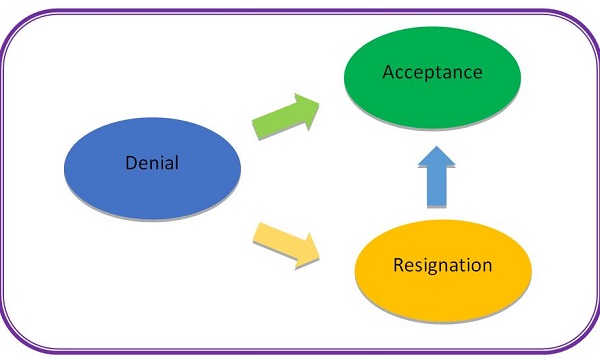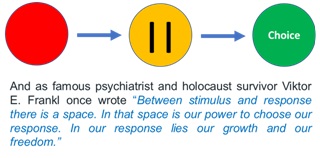A Coaching Power Tool By Suyin Ong, Cancer & Parenting Coach, MALAYSIA

How to Use Denial vs. Resignation vs. Acceptance
My Story
As I think of my journey when I was first diagnosed with breast cancer at 50 years old, I analyzed my state of mind during the different stages/phases. My first reaction when I was given a diagnosis is that “What? The doctor must be lying. Or maybe the person who took my biopsy got the results mixed up with another person. How could this be when the oncologist I went to see a few months ago laughed at me when I asked him to check me, and he literally told me not to think of weird things when I looked and sounded like any other normal person”. These thoughts went through my head over the next few days as I scheduled myself to go for a second opinion. After I got the second opinion which confirmed the first doctor’s opinion which was, I had an aggressive form of breast cancer, it literally took me a few days before this actually sunk in. During that period, I felt I was going through the motions like an android and nothing seemed to matter. When it finally sunk in that even if I go for a third opinion, it will likely be the same. I felt lost. I was in a state of shock and numb àI felt like I was like a robot, just going through the motions of life. I scrambled and spent a lot of time researching the medical terms that were thrown at me as it was really overwhelming. The more research I did on what my biopsy report meant, the more depressed I became. The research indicated a bleak outlook. With that, I flipped from a state of denial to a state of resignation.
I continued to do more research and through this time, even more soul-searching. I thought of my mother who had passed away from lung cancer quite swiftly many years ago just when she was starting to enjoy her retired life. As I pondered more and more, I became more at peace with the situation I was in. As I came to terms with my diagnosis, I couldn’t ignore and brush off what my specialist doctors (and there were at least three of them) were telling me. I decided that I will take things as it comes. It was not to say I will just not do anything. I will do what I can within my control and take it from there. I was very tempted to go with alternative therapies. My husband and family were anxious and had many people calling me to advise me to do the conventional Western treatments. I gave in to this as in my mind, the decision was not just for me but for my family. However, I took control of what else I needed to do to help myself through the situation. Analyzing my state of mind throughout this, I flipped from Denial to Resignation and then landed at Acceptance. What are the differences?
 If we looked at the definition of denial (see Appendix), the psychological version of denial means “a defense mechanism in which confrontation with a personal problem or with reality is avoided by denying the existence of the problem or reality”. This picture illustrates what the state of denial is. It is our natural human coping mechanism to block out what is uncomfortable for us. We want to see only what we want to see — it’s a survival tactic for us. However, it may not serve us to be in the denial state for too long. This tends to be a negative state and it could either drain our energy or at best, it doesn’t change our energy, but it does keep us in a blind spot. So, we can’t be proactive or do anything to prepare ourselves for the situation. As a coach, we need to be mindful that denial does have its usefulness. In some cases, initial short-term denial can be helpful and a good thing. Being in denial gives our mind the space to unconsciously absorb shocking or distressing information at a pace that won’t send us into a psychological tailspin. As a coach, we must let the client sit with their emotions and state….so if they are in a denial state, we should give them the space for them to explore and come to terms with what is happening. This means we shouldn’t rush the clients to avoid this denial stage. To some extent, this stage may be a necessary phase for the client to go through. This denial stage is akin to us touching a hot stove and having that instinctive reaction to pull away. If we can feel the hot stove, our survival instincts kick in. However, if we continue to let our hands on the stove, we will end up hurting ourselves quite badly.
If we looked at the definition of denial (see Appendix), the psychological version of denial means “a defense mechanism in which confrontation with a personal problem or with reality is avoided by denying the existence of the problem or reality”. This picture illustrates what the state of denial is. It is our natural human coping mechanism to block out what is uncomfortable for us. We want to see only what we want to see — it’s a survival tactic for us. However, it may not serve us to be in the denial state for too long. This tends to be a negative state and it could either drain our energy or at best, it doesn’t change our energy, but it does keep us in a blind spot. So, we can’t be proactive or do anything to prepare ourselves for the situation. As a coach, we need to be mindful that denial does have its usefulness. In some cases, initial short-term denial can be helpful and a good thing. Being in denial gives our mind the space to unconsciously absorb shocking or distressing information at a pace that won’t send us into a psychological tailspin. As a coach, we must let the client sit with their emotions and state….so if they are in a denial state, we should give them the space for them to explore and come to terms with what is happening. This means we shouldn’t rush the clients to avoid this denial stage. To some extent, this stage may be a necessary phase for the client to go through. This denial stage is akin to us touching a hot stove and having that instinctive reaction to pull away. If we can feel the hot stove, our survival instincts kick in. However, if we continue to let our hands on the stove, we will end up hurting ourselves quite badly.
We can help our clients change their perspectives by helping them reframe their perspectives. In cognitive psychotherapy, reframing means seeing something in a new way, in a new context, with a new frame around it[1]. It is like looking at that same situation with a different pair of glasses. Reframing our thoughts is like taking off our sunglasses or putting on another pair with a different lens. We are asking, ‘How can I look at this a different way?’” It’s similar to whether we look at the glass that is half empty or do we look at the glass that is half full?” When we help our clients reframe, we should also be mindful that it is not just a positive spin but grounded with reality as well.
The contrasting flip side of denial (or avoidance behavior) will then be resignation where it’s the state of being resigned. This means we submit ourselves to whatever it is without doing much with it. Another flip side of denial may be accepted.
 Acceptance does not mean passive resignation. Resignation means giving up because we have decided that there’s nothing we can do about our situation, whereas acceptance simply means that we accept that our situation happened. It doesn’t mean that we like what’s happening or that we don’t wish it were different, but once we give up the resistance and denial, we can take the energy we were spending on struggling and use it to decide how to respond or what to do next. In this way, acceptance can be liberating.
Acceptance does not mean passive resignation. Resignation means giving up because we have decided that there’s nothing we can do about our situation, whereas acceptance simply means that we accept that our situation happened. It doesn’t mean that we like what’s happening or that we don’t wish it were different, but once we give up the resistance and denial, we can take the energy we were spending on struggling and use it to decide how to respond or what to do next. In this way, acceptance can be liberating.
Relating an example of acceptance to my story: After I decided to go for chemotherapy on my own accord, I was already warned by my oncologists to expect my hair to fall out. I was hopeful after 3 treatments as it didn’t fall out. However, from the 4th treatment onwards, my hair started to come out in clumps especially when I brushed my hair. I had to come to terms with the hair loss and as I was already tired after each treatment and didn’t want the added burden of continuously sweeping my hair away, I decided to take myself (and my son as an excuse) to the barber. After the barber had cut my son’s hair, I asked the barber to shave off my hair. The barber was really taken aback and after I convinced him, then only he abided by my request. I can still remember the feeling of lightness as I walked out of the shop with a bald head. It was a huge relief for me, and it was a significant turning point as I felt I was in control of my situation. That was a very powerful feeling.
 As a power tool[2], there are many types of questions that we can ask our clients to help them reframe their situation either from Denial to Resignation or Acceptance or from Resignation to Acceptance. When we reframe, we are taking a pause from our automatic reaction to decide how to respond.
As a power tool[2], there are many types of questions that we can ask our clients to help them reframe their situation either from Denial to Resignation or Acceptance or from Resignation to Acceptance. When we reframe, we are taking a pause from our automatic reaction to decide how to respond.
These Coaching Questions can include:
- What can you do to look at it from a different perspective? OR What is another way of looking at this? OR What is another side that you haven’t considered yet?OR By having that perspective, how does that affect you?
- If you take on the role of a friend advising you on this, what would you tell your friend?
- How do these thoughts serve you now? OR What is the benefit of staying just as/where you are? OR What can you get from this?
- With all of this, what are some of the things you can be grateful for?OR What opportunities will this experience provide you?
- What positive things could come from this? OR How could you benefit from the situation?
- What’s the worst that can happen?
- How does this look in the long term?
- How does this look in the short term?
- How else could you interpret this experience? OR If there was a lesson to be learned here, what would it be?
- How can you challenge the situation instead of letting the situation challenge you?
- What change needs to happen so that [what the client thinks he/she is facing]?
- What would make the biggest difference in your life right now?
- In light of the current situation, how would you like to show up in life?
- How can you accept things that you can’t control? If you were to engage in ‘radical acceptance of this situation/ reaction, what would that look like and how would it feel?
- How can you create realistic expectations for yourself and your loved ones?
- What are the strengths you can bring to navigate through this?
- How will you want to look back on your actions one year from now? Five years from now?
- How can you find purpose or meaning in this difficult event?
- Where can you have some influence even if you are not calling the shots?
- If these are the cards you have been dealt with, what is your best play?
The Difference Between Denial vs. Resignation vs. Acceptance
Definition of Denial
1: refusal to satisfy a request or desire; the denial of privileges
2a(1): refusal to admit the truth or reality of something (such as a statement or charge); //their denial of the divine right of kings
(2): assertion that an allegation is false //her denial that she was involved
b: refusal to acknowledge a person or a thing: DISAVOWAL //his denial of his youngest son
3law: the opposing by the defendant of an allegation (see ALLEGATION sense 2) of the opposite party in a lawsuit their denial of the plaintiff’s allegations
4: SELF-DENIAL… a man in denial about his receding hairline.
5logic: NEGATION sense 1b
6psychology: a defense mechanism in which confrontation with a personal problem or with reality is avoided by denying the existence of the problem or reality
in denial
: refusing to admit the truth or reality of something unpleasant //a patient in denial about his health problems
Definition of Resignation
1a: an act or instance of resigning something: SURRENDER
b: a formal notification of resigning
2: the quality or state of being resigned: SUBMISSIVENESS
Definition of Acceptance
1: the quality or state of being accepted or acceptable. His theories have gained widespread acceptance.
2: the act of accepting something or someone: the fact of being accepted: APPROVAL acceptance of
3law: an agreeing either expressly or by conduct to the act or offer of another so that a contract is concluded and the parties become legally bound
4a: the act of accepting a time draft or bill of exchange for payment when due according to the specified terms
b: an accepted draft or bill of exchange
References
Adams, Marilee, Bernett-Koehler Publications Inc (2015), “Change Your Questions, Change Your Life: 10 Powerful Tools for Life and Work, the 2nd Edition
Cancer Council NSW (2021), “Common Reactions”.
Jevne, Ronna F.; Nekolaichuk, Cheryl L; Williamson F. Helen A, Canadian Journal of Counselling (1998), “A Model for Counselling Cancer Patients
Mayo Clinic, “Denial: When It Helps When It Hurts”.
Nicolaou, Barry “Thrive: What if Everything You’re Going Through Is Preparing You for What You’ve Asked For?”
[1]Elaine N. Aron, the Highly Sensitive Person: How to Thrive When the World Overwhelms You
[2]Aside From Reframing as a Power Tool to Help, There Are Other Modalities Like grounding exercises Like Deep Breathing, Getting a Glass of Water, Muscle Relaxation, or Visualizations That Can Also Help.